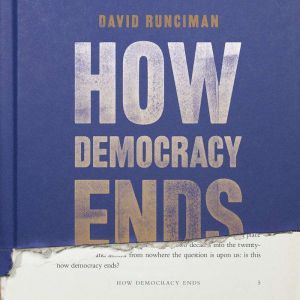Quotes
"The
cogency, subtlety and style with which he teases out the paradoxes and perils
faced by democracy makes this one of the very best of the great crop of recent
books on the subject."—The Guardian (UK)
"How Democracy Ends is a thorough study of democracy and its trials and tribulations on approaching midlife. Inhabitants have enjoyed its fruits: freedom, prosperity, and longevity. Democracy offers us opportunities to do exciting things."—New York Journal of Books
"In his
admirable analysis, How Democracy Ends, he says the trouble is that we remember
the least helpful bits of history, perpetually harking back to the 1930s to
explain the aspects of modern politics we like least: Trump especially."—Evening Standard (UK)
"Presented in pellucid prose free of the jargon of academic political science, How Democracy Ends is a strikingly readable and richly learned contribution to understanding the world today."—New Statesman (UK)
"Democracy isn't dead, not yet, but it could use some physical therapy while it steps gingerly into the grave. For all its optimism, an urgent, necessary book of cold comforts."—Kirkus
"Those
who welcome encouragement to consider all sides and avoid jumping to
conclusions...will find this a reasoned and balanced analysis of the political
moment."—Publishers Weekly
"What kills democracies? And, when they're dead, what replaces them? In this bracing reckoning, the brilliant David Runciman asks a series of questions whose answers take him from Hobbes to Gandhi, from the Colosseum to Facebook. A searching and urgent book."—Jill Lepore, author of These Truths: A History of the United States
"As our advanced democracies wither, David Runciman suggests we may have been looking in the wrong places to understand what is happening. This wise and sobering book argues convincingly that neither history nor contemporary autocratic regimes offer a good guide to democratic decay. If and when Western democracies end, they will do so in novel ways not experienced previously or elsewhere. Runciman's book breaks genuinely new ground in a very crowded field."—Dani Rodrik, Harvard University




